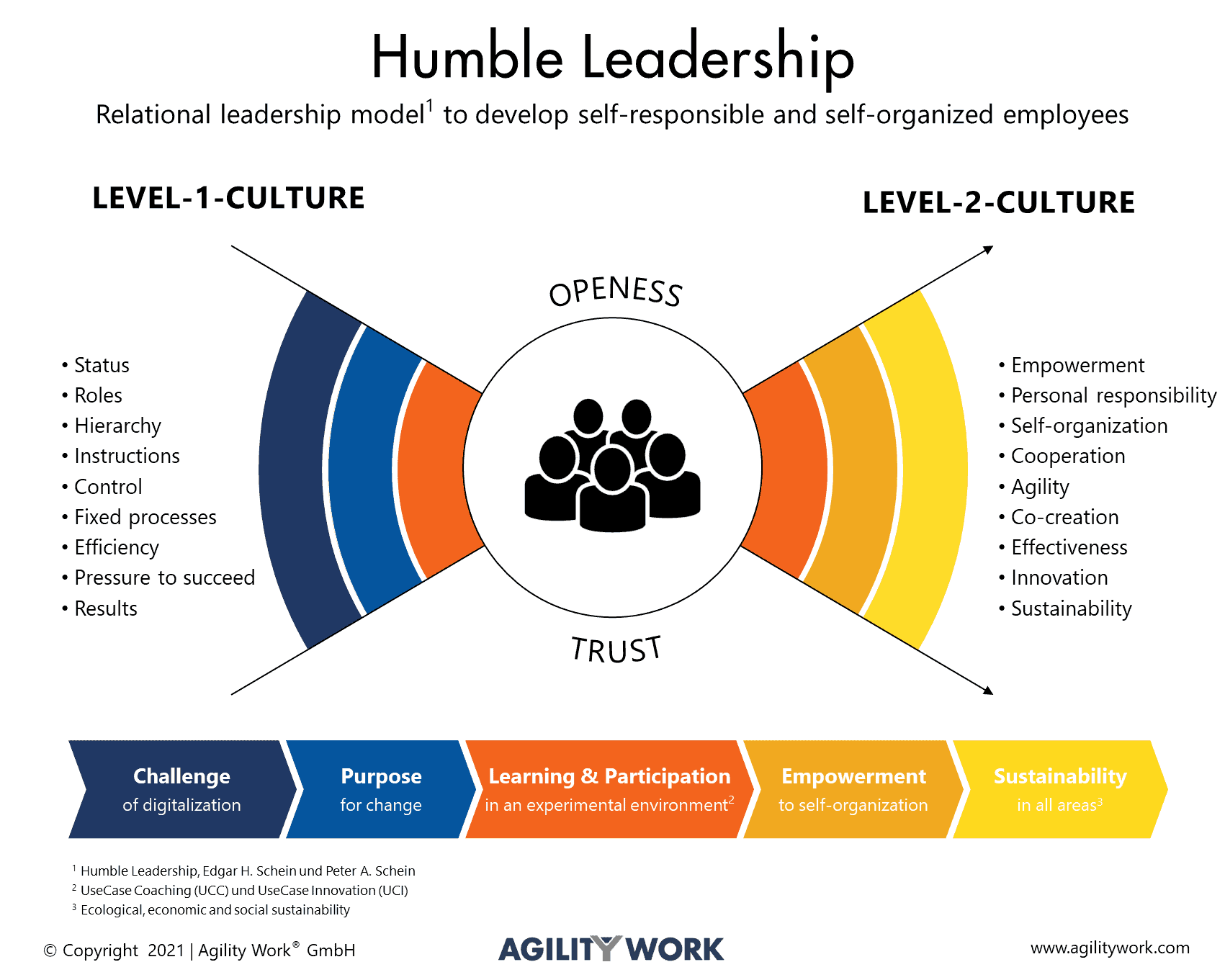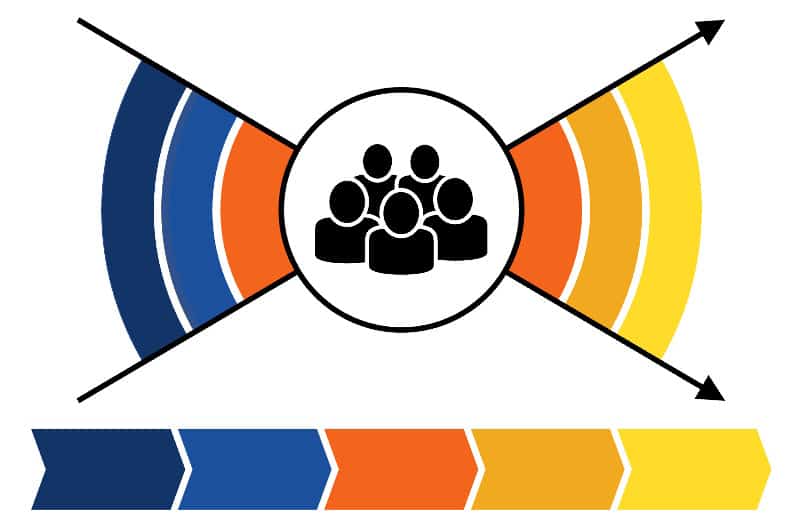With the basic principles of HUMBLE LEADERSHIP you create a cooperative and trusting leadership culture for NEW WORK. Humble Leadership avoids the „Leadership Gap“ that occurs when external frameworks or methods are implemented without preparing the ground for cross-functional and cross-hierarchical collaboration. With Humble Leadership, you lead your organization to trusting relationships and collaborative participation – exactly what employees increasingly expect or demand. If you want to retain skilled workers and recruit new talent and professionals for digitization, you also need to invest in culture change toward greater empowerment, agility, and co-creation. Humble Leadership broadens the perspective to shape the culture change itself so that the new culture follows the own vision and fits the ecosystem of the company. Through shared learning and collaborative participation, you reinforce the community’s sense of „we“ in co-creating the future. Step by step, the willingness and ability unfolds so that both digitalization and „internal renewal“ succeed in a contemporary, agile organizational form.
Humble Leadership does not view leadership two-dimensionally from a top-down perspective, but describes a multifunctional leadership culture that exists at all levels and within every team. Therefore, Humble Leadership is not only aimed at owners, managers, executives and change leaders, but also at all members within self-organized teams, e.g. Scrum Masters, Product Owners and developers. It is about building authentic relationships and trust among each other so that the group and the overall organization becomes more adaptable and can grow organically. In a New Work culture of self-determination, each person must be empowered to behave as a team player and also be a leader within their area of responsibility. The humble approach of Humble Leadership succeeds in shifting the paradigm from a hierarchical top-down culture to an agile New Work culture. Everyone works toward the common goal of making the organization great and making a personal contribution in shaping the future-ready, attractive and sustainable company.
Interacting with the team fosters a willingness to work closely together and builds the level of trust in a continuous development process. In a high-performance team, mutual trust is elemental. The Humble Leadership approach succeeds in transforming negative relationships, where indifference, withholding important information and manipulation are on the agenda, into positive and personal relationships. This leadership skill is especially critical with virtual, temporary, and interdisciplinary teams to create a lasting foundation of trust and become more agile, adaptable, and collaborative. As a result, teams become more capable of conflict and more resilient. More capable of conflict means that conflicts are dealt with on the factual level and not on the long-lasting emotional level. More resilient means that the good team spirit and intrinsic motivation is not lost in the face of setbacks and failures, but that the team feels strengthened and confirmed that it can achieve the goals it has set.
In their book HUMBLE LEADERSHIP – Successfully Leading with Relationship, Openness and Trust, Edgar H. Schein and Peter A. Schein present a perspective on leadership as a process of learning and participation. „Humble Leadership can help future groups become more agile, adaptive, and collaborative to align leadership with employees, stakeholders, and customers.“ (see Chapter 7: Humble Leadership and the Future, p. 113ff). Ed and Peter convey a new leadership approach to transforming an authoritarian, competitive culture to more employee participation, cooperation, and agility. The cultural shift to more agility is necessary to manage the exponentially increasing complexity of tasks and to adapt quickly to changing market conditions. Humble Leadership enables organizations to develop the elemental ability to adapt and benefit from digitalization.
OPENNESS AND TRUST
At its core, Humble Leadership is based on building personal relationships characterized by mutual openness and trust. The development toward an open and trusting attitude requires a continuous transformation process, because the currently prevailing leadership culture is based on deep-seated convictions that have been very successful in the past and have also been accepted by all stakeholders. With the new demand for development and co-determination (New Work), the values and principles are shifting toward more self-organization, personal responsibility and collaboration. The task of leadership is to assemble qualified teams of experts who can fulfill the individual wishes of customers in an appreciative and agile environment. „Enabling new customer experiences and long-term customer relationships is no longer the responsibility of marketing and sales alone, but part of the business model and thus the responsibility of all departments.“ (see the Berlin Management Model for Digitalization BMM® developed by Prof. Dr. D. Georg Adlmaier-Herbst, BMM®
The following graphic outlines the transformation from the Level 1 culture, which is characterized by values and principles for maintaining the existing order, to a Level 2 culture that promotes innovation, is dynamic and capable of change.

(Source: Agility Work)
1. Challenges
The transformation from Level 1 to Level 2 culture begins with an open discussion about the challenges of digitization, cultural transformation and sustainability. In this context, it is important that digitization and the VUCA world are moderated credibly, not as a threat but as an opportunity for the future, with the involvement of all stakeholders.
2 Purpose
In order for the vision for the modern organization to become tangible for everyone, companies need a clearly formulated purpose that answers two questions for stakeholders: 1. „What do I actually gain from letting go of cherished principles and hard-won positions that were associated with security, recognition and personal prospects for the future?“ and 2. „What is expected of me and what do I have to do to ensure that the opportunities of digitization are also fulfilled for me in the future?“
3. Learning and Participation
The linchpin of any transformation is the phase of learning and active participation based on concrete use cases. It has been shown in many transformation projects that a continuous development process of learning (theory) and applying (practice) is far more efficient and effective than putting what has been learned into practice following a course or training lasting several weeks. This insight has given rise to the two formats UseCase Coaching (UCC) and UseCase Innovation (UCI). They enable the step-by-step implementation of qualification and innovation processes parallel to daily business (ambidextry) in a fault-tolerant experimental environment (innovation forge).
4. Empowerment
Empowerment can emerge on the basis of learning and participation. Empowerment does not mean delegating and controlling, but empowering to self-organize and self-determine. Empowerment can only succeed if there is simultaneous access to knowledge and information so that the right decisions can be made at the operational level. Empowerment does not work if knowledge is withheld and self-organization is only allowed to take place within the previous rigid structures (silos). Openness and trust are agile principles and prerequisites for doing the right thing and focusing on and maintaining value creation, productivity and customer satisfaction.
5. Sustainability
Sustainable transformation is about seamlessly connecting the two initiatives of digitalization and culture change and using them as high synergy potential. It is about unleashing the full potential and inspiring people to develop disruptive business models, digital products and sustainable solutions that enable healthy growth. There are many studies that show that sustainable companies are more successful provided they view sustainability as a healthy balance of economic, ecological and social perspectives and are able to communicate this openly and credibly both internally and externally.
Humble Leadership is a basis for the development of an individual fault-tolerant, open and trusting organizational culture, which offers the agile methods (Scrum, OKR) and agile frameworks (Lean, SAFe®) an overriding common cultural framework. This means that the existing corporate culture does not have to be subordinated to an „agile“ culture developed in Silicon Valley, but can be further developed individually and, above all, step by step on the basis of the company’s own vision, ideas and possibilities.
Humble Leadership is aimed at both leaders and followers. In distributed areas of responsibility, everyone should have basic leadership skills that enable trusting collaboration and organic growth:
Owners, managers and executives who are looking for a new way to initiate, design and moderate the cultural transformation from a hierarchy/dominance driven culture to an open, trusting and collaborative working environment.
Scrum Masters, Agile Coaches and Change Leaders who have realized that agile methods also need an emotional level in order to be successfully implemented and realized.
Scrum team developers and team members in agile networks who want to expand their leadership competencies to not only fulfill their role, but to be proactive and engaged for better group dynamics and collaboration. And also to be an exemplary authentic team player out of conviction and intrinsic motivation, so that new personal opportunities to take on further areas of responsibility arise.

2 days – or by agreement
Price on request
Dates by agreement
The workshop can be conducted online, as a face-to-face or hybrid event.
Request for a seminar, workshop, UseCase Coaching or transformation project: